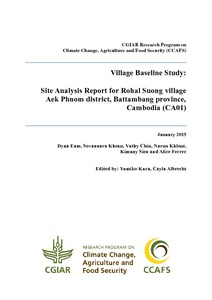Resource information
This report presents findings from a village baseline study conducted in Rohal Suong village in Cambodia. Findings have been gathered from focus group discussions and participatory resource mapping with community members in Rohal Suong. The site analysis is part of the CGIAR Research Program on Climate Change, Agriculture, and Food Security (CCAFS) Baseline Survey work and provides information on community resources, the organizational landscape, and information networks at the village level. These indicators will be monitored over time and compared across other village sites to assess changes in food security and natural resource management.
The baseline study shows that Rohal Suong is endowed with several types of natural resources, with little farm system diversification and livelihoods, but good access to physical and institutional infrastructure.
When it comes to networks of information, the findings show that people receive and access a variety of community-level information, as more than 60% of the households can access a TV and/or radio. However, most of the accessed information does not necessarily relate to agriculture, weather, climate and/or environmental changes.
The main challenges include deteriorating natural resources, high input costs on the farm with low production profitability. The community also lacks understanding of how to adapt their agriculture practices to the now increasingly variable seasonal cycle of flooding and drought. The community has identified irrigation water management and farm trainings as priorities for increasing agriculture productivity and profitability in the village.


